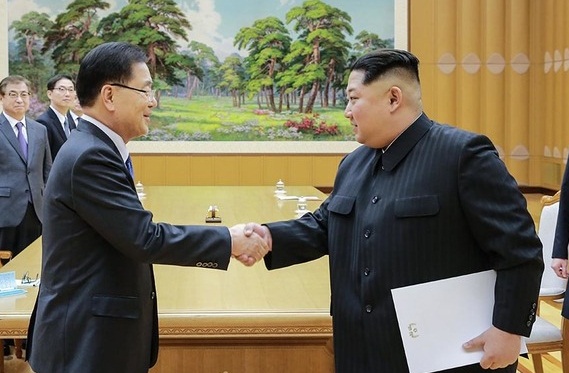
RNA - This basically means the two Koreas have now opened a new era of peace, pledging that there would be no further conflict on the Peninsula and vowing to upgrade relations in multiple spheres. This is while some media outlets in the West continue to suggest that while the two leaders agreed on “total denuclearization,” no details of steps to achieve this were included, and that the issue should be deferred to the upcoming North Korea-US summit in May or June. Far from it:
- The Panmunjom Declaration for Peace, Prosperity and Unification of the Korean Peninsula should be treated for what it is: Peace, prosperity and unification of the Korean Peninsula. Those who signed the declaration should never be comfortable with allowing the United States to enter into the equation. Irrespective of the upcoming North Korea-US summit, the Koreas should continue communicating, set in place a long-term dialog process, and ultimately pave the way for peace and reunification. They should never allow the US government to get in the way of this declaration which they both know is a precious and valuable agreement.
- It’s important to remember that American companies benefit in times of uncertainty and war, and some sectors provide cover for investors i.e., American arms manufacturers and defensive sectors. Demand for companies in the defense sector goes up in times of escalating geopolitical tensions in the Korean Peninsula, and some companies retain their value. Examples of sectors that are part of the defensive sector include subsidiaries of the Military–Industrial Complex, healthcare and consumer staples. Demand for these American industries remains stable even in negative economic business cycles. If the Koreas ink the final peace deal later this year, the defensive companies in the US will stand to lose big time. They might even try and use their lobbies in Washington to derail The Panmunjom Declaration.
- Regarding the nuclear crisis, the leaders of two Koreas agreed that total denuclearization will be achieved. They even affirmed that is their goal. This is because the nuclear weapons and missile programs that have led to a state of high risk in North Korea’s relations with the United States, has nothing to do with Seoul. The three-page declaration is also about resolution of military tensions including an end to the Korean War, which won’t go so well in Washington either. The big-ticket issue – denuclearization – which came at the end, will remain a sticky point. Washington will undoubtedly use it as a pawn against The Panmunjom Declaration to get incentives from South Korea.
- The declaration should facilitate advancements in inter-Korean relation and allow Koreans to determine the destiny of the Korean nation on their own accord. They should never allow US government’s interference that in the 20th century proved tragic for a Peninsula which suffered colonization, division and war. All the upcoming dialogs and negotiations in various fields, as well as active cooperation, exchanges, visits and contacts at all levels should be solely between the two Koreas. No liaison office by Washington will ever facilitate such close consultation, much less cooperation and peace in the Peninsula.
- As per the declaration, the two Koreas have agreed to completely cease all hostile acts against each other, including land, sea and air, and to cease all propaganda broadcasts and leaflet drops along the DMZ. This leaves no further excuses for the United States military to occupy the Peninsula. A continued presence of US military forces along the DMZ will only increase the possibility of accidental military clashes and even guarantee new hostilities – something Washington will never mind.
- Finally, the declaration has confirmed the common goal of realizing, through complete denuclearization, a nuclear-free Korean peninsula, and agreed to seek the support and cooperation of the international community to that end. True, there are no details in this respect. The declaration is long on generalization and contains absolutely no detail. However, this does in no way mean that much now hinges on successful discussion between the US and North Korea – something we all know isn’t going to be that easy. Mind you, it took Iran and the P5+1 group of countries some ten years to sign the nuclear accord in 2015. It might take even longer than that for Washington and Pyongyang to reach some kind of agreement on denuclearization. However, this should never be the focus of inter-Korean meeting because it has always been an issue between North Korea and the United States.
Once again, this is a precious opportunity for the Koreas to be one. What the Korean Peninsula needs now is peace and that could happen with or without any denuclearization agreement between North Korea and the United States. The newfound inter-Korean cooperation elements are more than enough for Seoul and Pyongyang to systemize their dialogue, show long-term commitment in their future summits, and ensure that The Panmunjom Declaration was not a one-off affair. All they need now is get the United States out of the Peace House picture.
Source: Fars News Agency
847/940